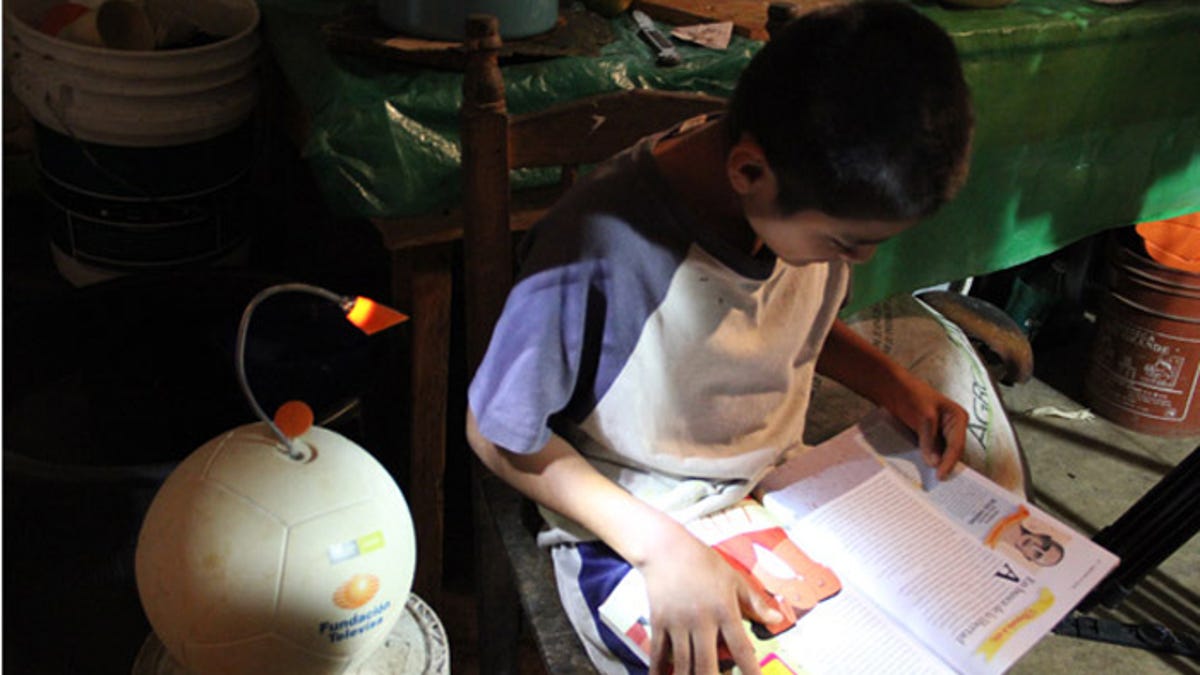Uncharted Play responds to Soccket quality concerns
Uncharted Play, creator of the Soccket, has responded to concerns about faulty balls, and is working to distribute a new ball ASAP.

(Credit: Uncharted Play)
Uncharted Play, creator of the power-generating soccer ball Soccket, has responded to concerns about faulty balls, and is working to distribute a new ball ASAP.
The story that appeared on PRI's The World about Uncharted Play's Soccket — a soccer ball that could generate energy and power a small LED light — certainly seems like a cautionary tale indeed, but it's not quite cut-and-dry, the company claims. Talking to CNET Australia, Uncharted Play's Jessica Matthews clarified what has gone wrong with the gadget, and what the company is doing to fix it.
"First, it's important to note that we're talking about two different versions of the Soccket — the version that was sent to Mexico via Televisa's funding, and the version that was later released to our Kickstarter backers. The first version, while a huge improvement from our first 2lb, wobbly prototype, featured a 12 panel design that had not been tested under extreme heat. We wanted to do the testing but experienced pressure from our funding partner to get the units out — we compromised and agreed to do a pilot test of 150 balls so we could get real-world feedback. 3.3 per cent failure rate isn't bad, but it wasn't good enough for us, so we started designing the version that the Kickstarter fans were meant to receive."
For the updated version of the ball, a new kind of foam was chosen, and the design changed from 13 pieces to two. But the foam in the final version of the ball wasn't the foam approved by Uncharted Play — an issue employees at the company realised when they started to play with their own Socckets. Then the lamps, which had been outsourced to a third-party company overseas, started failing. Although they worked fine under in-house testing scenarios, use over time revealed that the wiring was poor and that the lamps, when plugged in a number of times, would fail.
"I think we were too trusting of our vendors," Matthews told CNET Australia. "We assumed that they would be above board, and now we know we need to do more to assure quality throughout the supply chain process. In terms of Puebla, Mexico, I still feel like the feedback we received on the ball was worthwhile and that it was good to get notes from real people on the ground. Most normal soccer balls last about 1 to 6 weeks in rough terrain. With an R&D budget about 0.1 per cent the size of most major soccer ball companies, we weren't just trying to create a better soccer ball for regions like this, but a ball that inspires hope and innovation in communities where people don't believe in the power of their own ideas."
When PRI's The World investigator Jennifer Collins went to talk to the families in Pueblo who had received faulty balls, the Uncharted Play team had already been aware of the issue and were working hard on a new version of the ball to send to the families.
"As soon as we learned of the issue, we started working on the redesign," Matthews said. "It can take a company anywhere from 18 months to four years to release an updated product, but we worked like crazy to get something out in 10 months. That said, it's also unclear where Jennifer got all of her facts. 3.3 per cent of the balls failed — not 30 per cent. Puebla is 90 per cent off the grid. She mentioned that she spoke to a little girl whose ball had broken on the first day, but when our Child Fund contact received the name of the girl from her, they could not find her in the database of families that had received a ball."
As for Kickstarter backers, they, too, will be receiving new version of the ball, Matthews explained — and this time, the company is doing its best to ensure a robust product.
"We've partnered with two amazing manufacturing firms in upstate NY to streamline the assembly and quality process, we brought on a consulting agency to help review our materials, and we're working on a partnership with a supply chain management firm in Asia," she said. "In addition, we started opening up our product testing to our local community, inviting people to 'Come Bust Our Balls' — essentially kicking the crap out of the latest versions of the Soccket we develop and our other products as well."
While this has been a learning curve for the company, Matthews feels that Collins was dishonest about her intentions, and unfair on Soccket.
"I wish Jennifer had been more direct and honest about the focus of her article," Matthews said. "We're an honest, young company still figuring out the best ways to accomplish our mission. If she had told us she had concerns about our product quality, I would have chatted with her for hours, explaining all of the crazy stuff we've been through and how we're working to make it better. We live in a society where people forget how difficult it is to make real, tangible things. The things you can't just pull up on your smart phone. When we share our story, I feel like we're helping other would-be social entrepreneurs realise that yes, it is tough, but it's not impossible."

